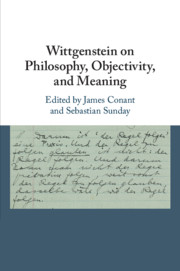Book contents
- Wittgenstein on Philosophy, Objectivity, and Meaning
- Wittgenstein on Philosophy, Objectivity, and Meaning
- Copyright page
- Contents
- Contributors
- Preface
- Acknowledgments
- Chapter 1 Anatomy of a Muddle: Wittgenstein and Philosophy
- Chapter 2 Explaining What We Mean
- Chapter 3 Objectivity
- Chapter 4 The Methodological Significance of Intuitions in Philosophy
- Chapter 5 Wittgenstein on ‘Seeing Meanings’
- Chapter 6 Bringing the Phenomenal World into View
- Chapter 7 First Steps and Conceptual Creativity
- Chapter 8 Wittgenstein and Analytic Revisionism
- Chapter 9 Demystifying Meaning in Horwich and Wittgenstein
- Chapter 10 What Is Meaning? A Wittgensteinian Answer to an Un-Wittgensteinian Question
- Chapter 11 Meaning, Use, and Supervenience
- Chapter 12 Some Socratic Aspects of Wittgenstein’s Conception of Philosophy
- References
- Index
Chapter 3 - Objectivity
Published online by Cambridge University Press: 15 August 2019
- Wittgenstein on Philosophy, Objectivity, and Meaning
- Wittgenstein on Philosophy, Objectivity, and Meaning
- Copyright page
- Contents
- Contributors
- Preface
- Acknowledgments
- Chapter 1 Anatomy of a Muddle: Wittgenstein and Philosophy
- Chapter 2 Explaining What We Mean
- Chapter 3 Objectivity
- Chapter 4 The Methodological Significance of Intuitions in Philosophy
- Chapter 5 Wittgenstein on ‘Seeing Meanings’
- Chapter 6 Bringing the Phenomenal World into View
- Chapter 7 First Steps and Conceptual Creativity
- Chapter 8 Wittgenstein and Analytic Revisionism
- Chapter 9 Demystifying Meaning in Horwich and Wittgenstein
- Chapter 10 What Is Meaning? A Wittgensteinian Answer to an Un-Wittgensteinian Question
- Chapter 11 Meaning, Use, and Supervenience
- Chapter 12 Some Socratic Aspects of Wittgenstein’s Conception of Philosophy
- References
- Index
Summary
A core philosophical use of the term “objectivity” is to talk about a central metaphysical ideal. The term is employed to pick out aspects of the world that are there in the sense that any thinker who fails to register them can be said to be missing something. If we speak in this connection of a guiding concept of objectivity, we can ask what can be said about the nature of the things that fall under it. We might then speak in this further connection of different possible conceptions of objectivity. Today, thought about objectivity is dominated by a conception on which objectivity is taken to have as its hallmark the exclusion of everything subjective. Starting from a description of the relevant conception of objectivity, this chapter criticizes the kinds of considerations most commonly adduced in the conception’s favor. Along the way, the chapter uses passages from the later philosophy of Wittgenstein as its main reference points. A notable virtue of this method is that it sheds light on the transformative significance of Wittgenstein’s thought for how we construe the concept of objectivity.
Keywords
- Type
- Chapter
- Information
- Wittgenstein on Philosophy, Objectivity, and Meaning , pp. 47 - 61Publisher: Cambridge University PressPrint publication year: 2019
- 1
- Cited by



